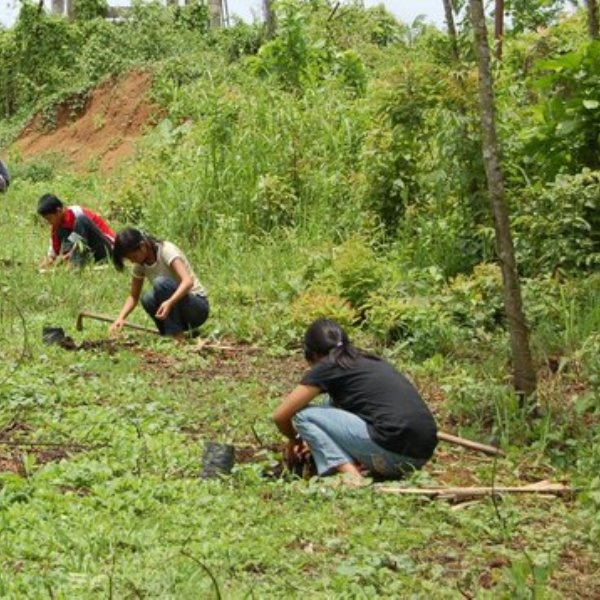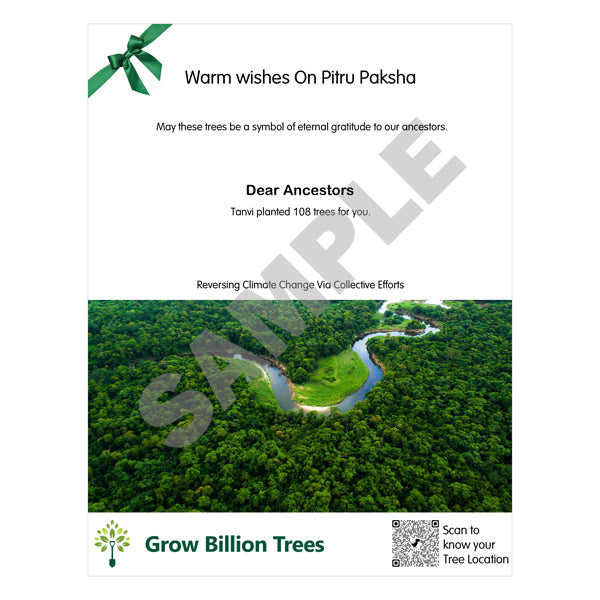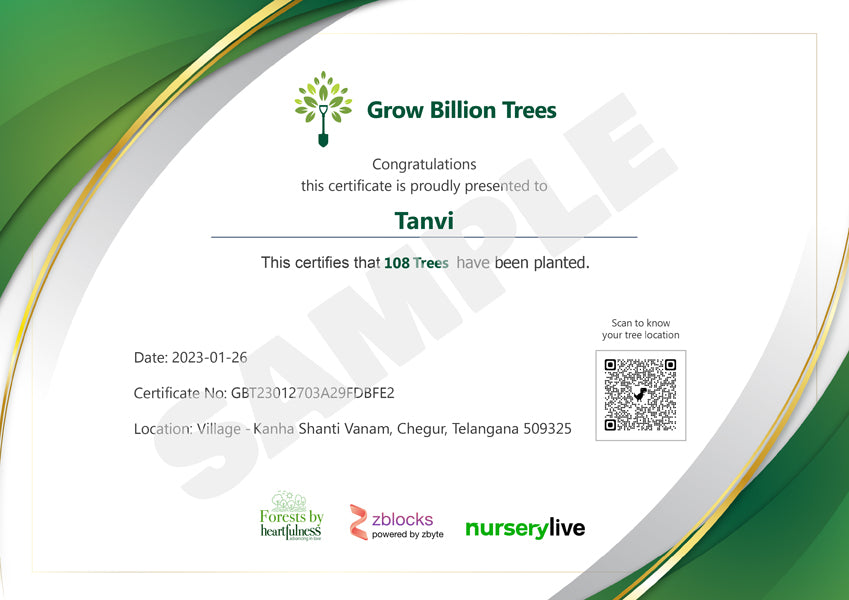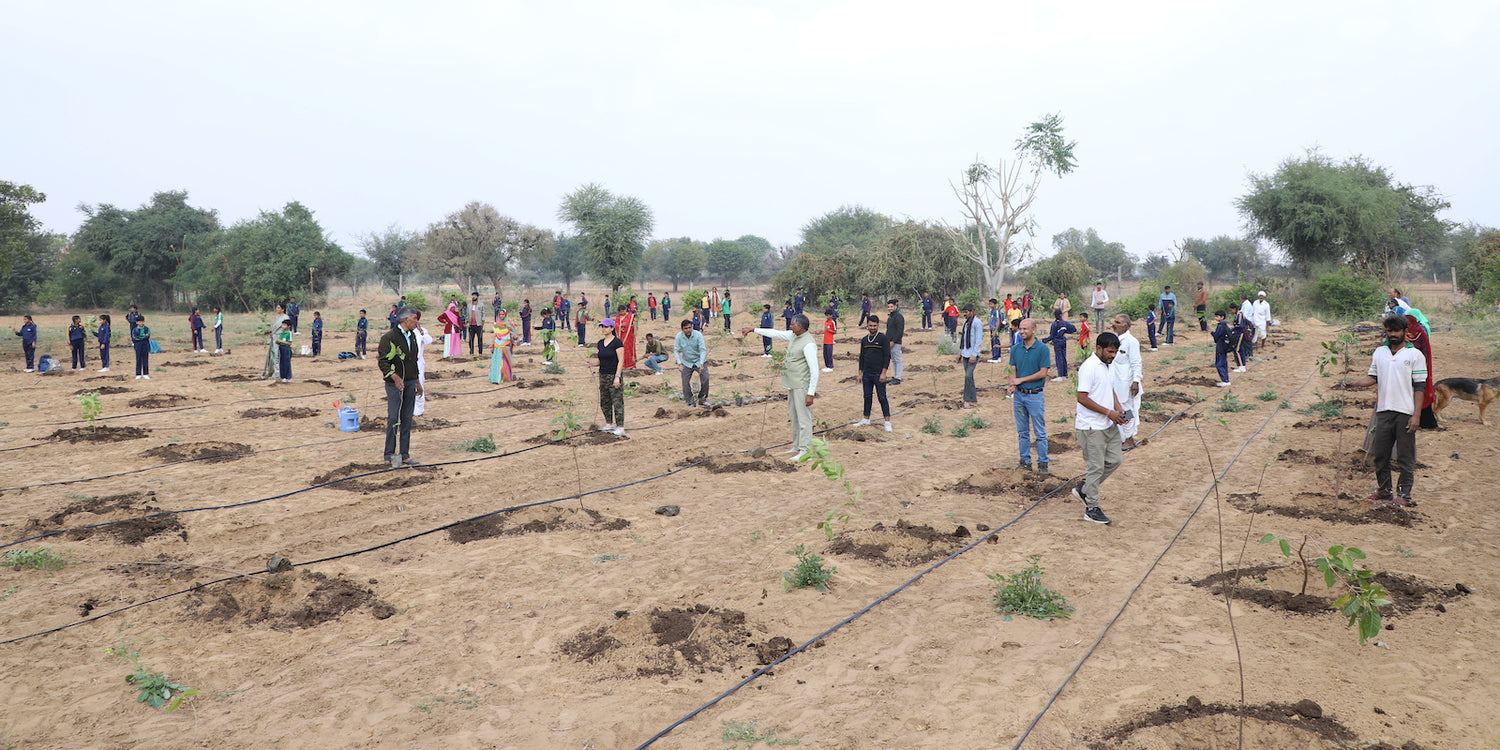Trees for Pitru Paksha (पितृ पक्ष)
Trees for Pitru Paksha (पितृ पक्ष)
🌳 2-3ft Tree + 3 Years Nurturing + Geo-Tagged
💡 Tip: 15 Trees for Pitru Paksha
108 Trees to Pay Gratitude to All Your Ancestors
Couldn't load pickup availability
What you get ?
Tree(s) Plantation
Tree(s) Plantation
A tree(s) native to the region will be planted within 7 -10 days, and post-plantation monitoring will be thoroughly managed.
*You will receive an email/whatsapp notification immediately after the tree(s) plantation. or you can check the current status by logging into "My Account" anytime.
e-Greeting Card of Tree(s) Plantation for Gifting
e-Greeting Card of Tree(s) Plantation for Gifting
If you want to gift these tree(s) to your loved ones, You can generate an e-Greeting card for tree(s) plantation by logging into "My Account" after placing order.
*Please generate it within 5 days of placing the order.
e-Certificate of Tree(s) Plantation
e-Certificate of Tree(s) Plantation
A e-certificate of Tree(s) Plantation with the project details will be issued in your name after tree(s) plantation.
*You can download it from "My Account".
Geotag of your Tree(s)
Geotag of your Tree(s)
You can immediately track the live location of the project chosen for your tree(s) plantation, by logging into "My Account" or, by scanning the QR code on the certificate.
*You can see Your Name in respective Project/Forest.
If you want to gift these tree(s) to your loved ones, You can generate an e-Greeting card for tree(s) plantation by logging into "My Account" after placing order.
View full details



Honoring the memory of our loved one with a tree planting on Pitru Paksha (पितृ पक्ष) can be a powerful and enduring way to pay tribute t Read more
Trending
Pitru Paksha Tree Plantation
Description:
Honoring the memory of our loved one with a tree planting on Pitru Paksha (पितृ पक्ष) can be a powerful and enduring way to pay tribute to their life. Trees offer comfort and connection and serve as a living tribute to the memory of your loved one.
In addition, trees provide practical and environmental benefits, such as capturing carbon dioxide, improving air quality, and providing habitat for wildlife.
Scope:
- Enhancement of Biodiversity
- Increase in Green Cover
- Generation of Rural Employment
- Increase in farm income for farmers
- Poverty Alleviation
Tree Species:
The species of trees that are planted depend on the project, and they are chosen based on their native habitat in the corresponding ecological zone.
Trees like peepal (Ficus religiosa), neem (Azadirachta indica), banyan (Ficus benghalensis), and tulsi (Ocimum sanctum) are traditionally planted during Pitru Paksh due to their sacred significance.
Why trees for Pitru Paksha?
Planting trees during Pitru Paksha (पितृ पक्ष), also known as Shraddha or Mahalaya Paksha, holds spiritual and cultural significance in Hindu traditions. This 16-day period, usually in September or October, is dedicated to honoring and paying respects to one's ancestors or Pitrus. Here's why planting trees during this time is considered important:
-
Environmental Consciousness: Planting trees during Pitru Paksha (पितृ पक्ष) reflects an awareness of environmental issues. It's an opportunity to contribute positively to the environment and show reverence to nature, aligning with the Hindu principle of dharma (duty).
-
Symbolism of Life: Trees are often seen as symbols of life and growth. Planting a tree in memory of departed ancestors can symbolize the continuity of life and the belief that the soul continues to exist in various forms.
-
Purification of Ancestral Spirits: Hindus believe that performing rituals and acts of charity during Pitru Paksha can help purify the souls of their ancestors. Planting a tree is considered a charitable act and can contribute to the well-being of departed souls.
-
Sustenance for Departed Souls: It is believed that the shade, fruits, and shelter provided by trees offer sustenance to the wandering spirits of ancestors. By planting trees, individuals seek to provide comfort and nourishment to their departed loved ones.
-
Karma and Positive Actions: Hinduism emphasizes the importance of karma (actions) and how they affect one's spiritual journey. Planting trees is considered a virtuous deed that can earn merit and positive karma for both the living and the deceased.
-
Environmental Benefits: Beyond the spiritual aspects, tree planting during Pitru Paksha has practical environmental benefits. Trees help improve air quality, provide shade, conserve soil and water, and support biodiversity.
In summary, planting trees during Pitru Paksha combines environmental consciousness with spiritual beliefs. It's a way to honor ancestors, promote positive actions, and contribute to the well-being of both the environment and the souls of the departed.
Social Impact of Trees for Pitru Paksha?
Planting trees for Pitru Paksha (पितृ पक्ष) has several social impacts, as it combines cultural and spiritual practices with environmental conservation. Here are some of the social impacts associated with this tradition: Overall, planting trees to honor the memory of a loved one can be a meaningful and impactful way to contribute to the health and well-being of the community and the environment.
-
Community Bonding: Tree planting during Pitru Paksha brings families and communities together, fostering stronger bonds and unity.
-
Cultural Preservation: It helps preserve and pass down cultural and religious traditions, reinforcing the importance of honoring ancestors.
-
Environmental Awareness: The practice raises awareness about the significance of trees in maintaining ecological balance and encourages responsible environmental stewardship.
-
Positive Social Norms: Planting trees establishes positive social norms related to environmental conservation and sends a message that caring for the environment is virtuous and responsible.
-
Community Health: The trees contribute to improved air quality and overall environmental health, directly benefiting the community's well-being.
In summary, planting trees for Pitru Paksha is a practice that goes beyond spiritual and cultural significance. It has several positive social impacts, including community bonding, environmental awareness, and the promotion of responsible environmental stewardship, while also contributing to the overall well-being of communities and the environment.
Pitru Paksh Tree Planting Ritual
The Pitru Paksh tree planting ritual is a sacred tradition performed during the 16-day period dedicated to honoring one's ancestors. This custom involves planting trees as a mark of respect and gratitude towards departed family members. Learn about the spiritual significance and detailed steps of this meaningful ritual.
Best Trees for Pitru Paksh Plantation
Discover the ideal tree species traditionally chosen for Pitru Paksh plantation ceremonies. Each tree carries its own symbolism and significance in honoring ancestors. Explore the diverse selection of trees that are considered auspicious for this purpose.
Pitru Paksh Dates and Tithis
Pitru Paksh spans specific dates and tithis (lunar phases) in the Hindu calendar. Knowing the auspicious days within this period is essential for conducting tree planting ceremonies and other ancestral rituals. Find detailed information about the dates and tithis for performing these sacred practices.
Environmental Impact of Pitru Paksh Tree Plantation
Learn about the positive environmental impact of planting trees during Pitru Paksh. Beyond the spiritual significance, discover how these tree plantations contribute to cleaner air, increased biodiversity, improved soil health, and overall ecological well-being.
Community Tree Plantation for Pitru Paksh
Engaging your community or family in tree plantation activities during Pitru Paksh can strengthen bonds and create a sense of togetherness. Explore the advantages of involving a group in these rituals and the positive impact it can have on both individuals and the environment.
Tree Care Tips for Pitru Paksh Plantations
After planting trees during Pitru Paksh, it's crucial to provide proper care to ensure their healthy growth and longevity. Get valuable tips and guidance on nurturing the trees you've planted, ensuring they thrive and flourish in honor of your ancestors.
Most Popular
Impact of your Tree
-
Releases Oxygen
A mature tree produces around 120 kilograms of oxygen per year, which is sufficient for one human per year.
-
Reduces Air Pollution
A tree absorbs harmful gases like CO2, NO2 released by factories and vehicles, which can have serious health problems for us
-
Removes CO2
A Tree removes 22 KGs of CO2 from atmosphere per year, which is equivalent to the CO2 realeased by a human in 10 days.
-
Cooling Effect
A Tree generates cooling effect of around 10 room size ACs by providing shade and through a process of transpiration.
Special Plantations
FAQ
What is Pitru Paksha (पितृ पक्ष)?
Pitru Paksha, also known as Shraddha Paksha, is a 16-day period in the Hindu lunar calendar dedicated to honoring and paying respects to one's ancestors or pitru.
Why is tree plantation important during Pitru Paksha?
Tree plantation during Pitru Paksha is considered auspicious and virtuous. It is believed that by planting trees in memory of departed ancestors, one can earn merit for their souls and contribute to environmental well-being.
Which trees are traditionally planted during Pitru Paksha?
Trees like peepal (Ficus religiosa), neem (Azadirachta indica), banyan (Ficus benghalensis), and tulsi (Ocimum sanctum) are traditionally planted during Pitru Paksha due to their sacred significance.
Can I plant any tree during Pitru Paksha?
While the traditionally significant trees are preferred, you can plant any tree that thrives in your local environment. The key is to do it with a pure and respectful intention.
How can I perform tree plantation during Pitru Paksha?
Choose a suitable location, preferably near your home or a sacred place. Plant the tree with reverence, offering prayers and water. You can also dedicate the tree to your ancestors during the planting ceremony.
What are the benefits of planting trees for ancestral souls?
Planting trees is believed to provide spiritual benefits to departed ancestors, helping them on their journey in the afterlife. Additionally, it contributes to a greener and healthier environment.
Can I involve my family and community in the tree-planting ritual?
Yes, involving family and community members in the tree-planting ritual can make it more meaningful and spiritually enriching. It can become a collective act of love and remembrance.
Are there any specific rituals or prayers for tree plantation during Pitru Paksha?
While there are no strict rituals, you can offer prayers, light incense, and chant mantras or hymns dedicated to ancestors while planting the tree.
Is there a specific date for tree plantation during Pitru Paksha?
Tree plantation can be performed on any day during the Pitru Paksha period, but many choose to do it on specific tithis or dates considered more auspicious.
How can I maintain the tree after planting it?
Regularly water and care for the planted tree. Prune it as needed and protect it from pests and diseases to ensure its healthy growth and longevity.





















